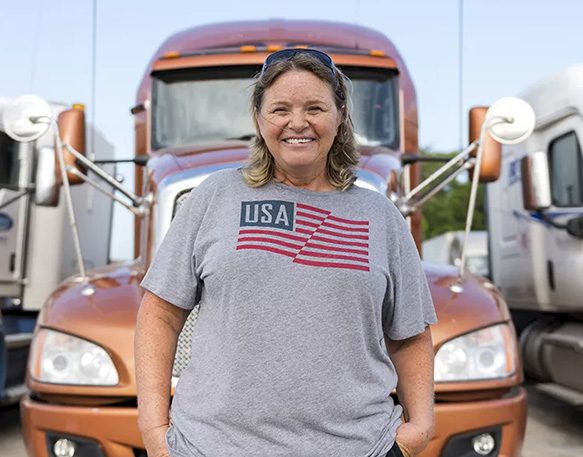If you employ other truckers, you’ll have even more work, from keeping track of their fuel and maintenance expenses to ensuring they’re paid on time. On top of all that, you must make the time to find freight. After all, you can’t keep the lights on and turn a profit unless you actually deliver loads and collect payments!
Unfortunately, finding freight worth delivering can sometimes be easier said than done. Sure, you can search for freight online, but many loads are priced extremely low — and even those can be hard to find. Wading through countless cheap loads to find good-paying ones and finding stats to bring to the negotiation table can consume hours of your valuable time before you know it. That’s where direct shippers trucking comes in.
In this article, we’ll go over what working directly with shippers means, its pros and cons, the difference between brokered and direct shippers, and the best way to establish a relationship with direct shippers. You’ll learn everything you need to know about establishing direct freight services to determine if it’s the right choice for your business.
What is direct shippers trucking?
Taking a direct shippers trucking approach means contracting direct shipper loads. Instead of working with a broker, you will work directly with your shipper.
Since many truckload shippers don’t have the time, money, or expertise to hire, train, and manage their own logistics team, they often outsource work to 3PLs and brokers. After all, working with a broker is easy and allows shippers to concentrate on their business instead of on logistical minutiae like handling carrier insurance or determining the best rates. All of that takes time and energy that truckload shippers don’t necessarily have, so brokers seem like the perfect solution.
Even though using a broker costs 15-20% more than working directly with trucking companies, shippers will use brokers in certain specific circumstances, like if something has gone wrong with their routing guide, if they have an unplanned shipment, or if they’re a very small business that ships too infrequently to contract their shipments out to carriers. However, truckload shippers typically prefer to contract carriers. That’s because, above all else, shippers want reliable, predictable service from their transportation providers. Direct freight services are typically the best way to attain that.
A great way to make those connections is to reach out to the shipper first, work to build a solid relationship with them, and generally make their job easier. Know that even if your first attempts don’t lead to contracts, there are still plenty of other truckload shippers out there looking for that reliability and predictability in addition to the lower costs that come with direct shipping.
What are the benefits of using direct shippers?
Using direct shippers can be a strategic move for many carriers, as direct shippers trucking offers plenty of benefits, such as:
- Lower overall costs and increased profits: With direct shippers trucking, you’ll work and negotiate directly with the shipper. Since there’s no intermediary in the form of a broker, you can both get what you want without a third party getting a cut of the final price.
- Less cheap freight: Since you’re working directly with the shipper, you don’t need to worry about other carriers accepting cheap freight, and you won’t have to spend hours filtering and sifting through unappealing load after unappealing load since you’ll be getting freight right from a trusted source.
- More consistent work: Instead of constantly searching for your next load, you can rely on your shipper to give you any freight they have. This can save you time, stress, and money in the long run. You may even develop a more-or-less set schedule.
- Steady rates: Whereas rates can vary drastically with spot market loads, you’ll receive the same rate in both good and bad times when you work with direct shippers trucking.
- Direct contact with shippers: This enables you to build a deeper relationship with your shippers and provide better overall service. After all, you’ll know about any issues or concerns as soon as a shipper brings them up, so you can quickly adjust or speak with them to soothe their fears.
- More potential business opportunities: Taking the time to establish a relationship with direct shippers will open the door to more business in the future. If you work directly with a shipper and provide reliable, cost-efficient service and prove a trustworthy partner, they’ll likely turn to you for more direct shippers trucking services. Freight brokers cost more, so if a shipper knows you’re trustworthy, why not use you and save some money?
In short, direct shippers trucking offers steady long-term business that you can use as a foundation for growing your business.
What are the drawbacks of using direct shippers?
Using direct shippers means lower overall costs, streamlined communications, more consistent work, better relationships with shippers, and more potential business opportunities. Still, there are also a few disadvantages you need to be aware of before committing to procuring direct shipper loads:
- More work on your end: The key to how to get direct shipper loads is forming and maintaining strong relationships with truckload shippers. When you work with a broker, they take on the vast majority of the work that goes into building a positive relationship with shippers, so you can focus your energy on direct freight services. However, working directly with a shipper puts all of that responsibility on your shoulders, meaning you may have to do some trial and error to build relationships with direct shippers.
- Easier to overcommit: It’s far more difficult to say you can’t do something directly to a shipper vs. through a broker. So, if you’re a small carrier trying to earn direct shipper loads, promising high-volume shippers you’ll provide predictable shipments can be tempting. However, over-promising and under-delivering can cause you to lose a customer and even damage your reputation, so it’s always better to be upfront with direct shippers.
- Business competition: Even with a strong relationship in place, working directly with shippers can be challenging when spot market demand for trucks drops. During these times, brokers and other carriers may offer to haul your shipper’s loads at lower rates. If your partnership isn’t fully solidified, your shipper might be tempted to switch to one of these alternatives, potentially putting your agreement at risk.
- Detention fee risks: If you charge a detention fee for time spent waiting at stops, direct shippers might work with a different carrier or broker that doesn’t have one. This puts you in the uncomfortable position of deciding whether waiting around for free at loading and unloading points or working with direct shippers instead of brokers (who will likely get you a detention fee) is more important to you and your business.
What is the difference between brokered and direct shippers?
Put simply, brokered truckload shippers use brokers to conduct their logistics activities, whereas direct shippers will work directly with you. So, what does this look like in practice?
With a brokered shipper, your communications will pass through the broker. If you want to negotiate a rate, you’ll need to let your broker know. Then, they’ll let the shipper know and get to work to find a solution that keeps you and your shipper satisfied. If something goes wrong, updates will be slow on either side because communications will need to pass through your broker. Of course, if you aren’t an expert researcher and negotiator, going with a broker might work out in your favor.
On the other hand, working with a direct shipper cuts out the intermediary steps. Communications will be streamlined, and it will be easier to develop a deeper, more lasting personal relationship with direct shippers. However, you’ll also have more responsibilities when it comes to negotiating rates. You also may have more difficulty getting your foot in the door because truckload shippers are often used to working with brokers rather than individual carriers, so you’ll need to figure out the best way to establish a relationship with direct shippers before you can start jumping into direct freight services.
What’s the best way to establish a relationship with direct shippers?
When it comes to direct shippers trucking, everyone will tell you they know the best way to establish a relationship with direct shippers. Some say the best way to establish a relationship with direct shippers is through using a supplier procurement site like Thomasnet and reaching out to companies that seem like a good fit. Others swear the best way to establish a relationship with direct shippers is through networking with locals in the area, whether that means knocking on doors, hanging up flyers, or attending industry events. However, we know the actual best way for carriers to get direct freight from shippers: using a load board.
A load board is a powerful tool that can connect shippers, carriers, and brokers. These online marketplaces allow shippers and brokers to post available loads, which present opportunities for carriers. By using a load board, a carrier can find direct shipper loads. Sounds great, right?
If you’re looking for a load board that goes above and beyond the rest, look no further than the DAT load board. With the DAT load board, finding and reaching out to direct shippers is easy. Plus, you’ll know whether or not a direct shipper is trustworthy from the get-go. Since you can view reviews from brokers and other carriers on the DAT Directory before you start working with a direct shipper, you won’t have to pick someone and hope for the best.
Then, should you decide to pursue a relationship with a specific shipper in the directory, you’ll have all the contact information you need at your fingertips, from their phone number to their address to their DOT number. You’ll also gain insight into the current spot market and contract rates through our load board (our info is based on $60 billion in real transactions!), which can level up your negotiation game.
Keep these steps in mind as you move forward
Regardless of which route you take when it comes to how to get direct shipper loads, there are a few things you’ll need to keep in mind before you start reaching out. You’ll want to ask yourself the following questions:
- What rate do I need? When you’re running your own carrier business, you need to stay on top of your rates. You should know exactly how much you need to make to turn a profit before you start reaching out to direct shippers. This will allow you to enter negotiations confidently and choose direct shipper loads and lanes that will help you earn money, not lose it.
- What lanes do I want to operate in? To find direct shippers, you need to know which lanes you wish to operate in. Otherwise, you might reach out to a shipper and start to build a relationship only to realize they don’t have any work in the lanes you want to work. Not only does this waste your time, but it also wastes theirs and could impact your reputation and future opportunities.
- Is there enough demand in these lanes? Finding your ideal lane is excellent, but if there isn’t enough direct freight to sustain your business, you’ll soon find yourself in hot water. So, if you only have one customer on that ideal lane, it probably isn’t perfect. You want to choose lanes with decent demand, so you won’t have to worry about stretches without any work.
- What will I do after delivering a load? In some cases, there may be return freight you can pick up. However, you may have to deadhead to the next load, which is far less profitable. Still, you can make up the difference by increasing your rates.
Answering these questions involves some research, but it will be worthwhile. Once you know these answers, you can allow them to guide your decisions. You’ll save time, money, stress, and energy by putting in the time now.
Also, remember that smaller direct shippers that don’t have frequent, consistent loads often scramble to book capacity from larger carriers. So, if you’re struggling to form strong relationships with larger shippers, it may be worth looking into smaller shippers. After all, just because they’re small or don’t have the same load headed to the same place every day doesn’t mean they don’t need reliable and cost-effective shipping.
As far as actually building a relationship and earning a contract, it’s important to be on time and available at all times. After all, direct shippers are looking for a reliable carrier to deliver their goods safely and on time. Taking care at the early stages of the relationship can show shippers what they can expect once they contract you.
If you’re struggling to initiate contact, you might even consider sending a personal letter or scheduling an in-person meeting for a presentation about your business and direct freight services. Let potential truckload shippers know what you excel at, whether that’s close attention to detail, incredible communication skills, or unique services.
Build stronger freight partnerships for long-term success
Working directly with shippers can transform your business, offering cost savings, steady work, and stronger relationships. While it requires effort to establish and maintain these partnerships, the rewards can be substantial, from more predictable rates to greater control over your routes. By understanding the nuances of direct freight and leveraging tools like DAT, you can streamline operations, secure profitable loads, and position your business for sustainable growth.
Find great loads from shippers with DAT!
The DAT load board is the best place to find great direct freight opportunities from trustworthy shippers. With information that helps you build relationships, understand market rates, and much more, the DAT load board is the best place to connect to great freight backed by great shippers. Get started today!




